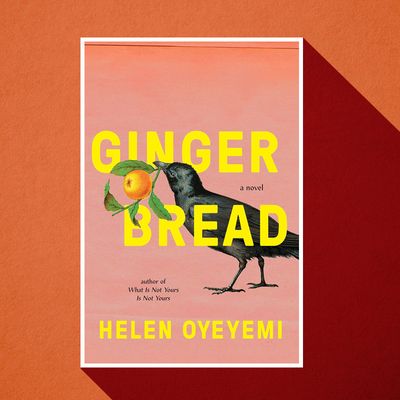
Helen Oyeyemi is a master of reinventing tropes from traditional fairy tales to say something entirely new about the world we live in. She twists familiar stories in entirely unpredictable ways, and her books never end up where you thought they would when you started.
Gingerbread is Oyeyemi’s latest, an audacious take on the food that housed a witch and nourished Hansel and Gretel. Gingerbread has always been a guiding force in the life of Harriet Lee, an immigrant to the U.K. whose teenage daughter Perdita has more than a few questions about her roots. When Perdita’s quest for the truth of her origins lands her in trouble, it’s up to Harriet to spill all of the family secrets. Sitting on her daughter’s bed, surrounded by four of her daughter’s dolls who just so happen to be able to speak, Harriet tells the story of her remarkable childhood in Druhastrana, a country somewhere in Central Europe whose Wiki page, in the world of Gingerbread, identifies it as an “alleged nation state of indeterminable geographic location.” The reader, along with Perdita and her dolls, get to listen in on Harriet’s astonishing bedtime story.
As always, Oyeyemi juxtaposes her fantastical storybook setting where just about anything can happen, with signifiers that firmly place the action in modern times. Gingerbread references Tinder and Ariana Grande and Skype conversations, among others. Over Skype, we talked about Amazon reviews, the believability of talking dolls, and the magic of telling unverifiable stories.
I’m always fascinated by where your books go plot-wise, because it’s not always evident in the jacket copy. You pull readers in with a fairy tale premise and then destroy their expectations.
It was actually very difficult to come of up with something for Gingerbread. I just wrote it and then was like, “Oh no, I have to describe what this is.” I was very confidently going along like “this all makes sense” and then at the end being like, “I cannot describe what this is overall.” I think you just have to read it.
I knew what to expect. I mean, not really, but I was ready for you to throw me some curveballs. How would you describe your work to someone who hasn’t read you before?
It’s that conversation I have with strangers when I say, “I write books.” And they say, “What kind of books?” and I just say, “Fiction.” I think describing it as just fiction does make sense. I suppose it’s a warning that what I write is made up, but it’s also very, very made up. It’s made up, but it knows that it’s made up, and it’s not trying to reconcile its contradictions. The normal and the strange are on the same level.
Whenever I read your work I love looking for mentions of the modern and mundane juxtaposed with the more fantastical stuff. This time my favorite detail was that Harriet enjoys writing five-star reviews on Amazon in order to counteract the bad one-star reviews. Do you read Amazon reviews?
Yes, but I stopped because it made me so sad. The review that made me saddest was because I felt that it was true. It said something like, “the author’s heart is in the right place but she doesn’t know how to communicate,” and I was like, “this is just too accurate.” After that I stopped reading my one-star reviews.
And no Goodreads, I take it.
Sometimes. But it feels like I could get into a swamp there. Someone read me a Goodreads review and it was really interesting. On the Chinese edition of Mr. Fox they have a quote from a Goodreads user on the cover, as the blurb. I was surprised by that. But it was an English Goodreads review that they had translated.
Was it particularly illuminating?
I didn’t think it was! It was very kind, but I don’t know why that one was chosen.
You’ve lived in Prague for the past six years. How much of the part of the world where you live now informs Druhastrana, the mythical country where Harriet grew up that may or may not exist?
It’s only something I could have come up with from being here in the center of Europe. I also spent a year in Budapest. I suppose I have a new perspective on European history because this was the actual theater of the Second World War. I’d grown up with a perspective from the U.K. and the Allies, but being where so many struggles were played out and laid on top of each other affected my plausibility meter. Suddenly it became plausible that there could be a country that only Czechs, Hungarians, and Slovakians knew about.
I liked Gingerbread’s anti-capitalist tones.
You caught that, did you? I’m not sure myself where it came from because, especially in Czechia, there’s still that feeling of having just been free of communism and free to enjoy capitalism in all of its speckled glory. But I don’t think there’s some sort of subconscious resistance to the celebration of it.
How does one go from living in a maybe made up place to going to live in the U.K., as Harriet did?
I didn’t think about the logistics of her trip too much. It was sort of freeing in that she tells this long bedtime story, and none of it is checkable or verifiable. So Harriet has the chance to describe everything on exactly her terms and how it felt to her, and let that be the reality. It’s like reporting without using “she said,” which you see sometimes in articles. Something terrible has happened to a person, and the reporter has to use the words “she said” instead of just letting it stand.
And the dolls only call bullshit on Harriet occasionally.
Yeah, “this is a bit far-fetched,” say the dolls. I thought Harriet was very kind to say to them, “but aren’t you a little bit far-fetched?”

